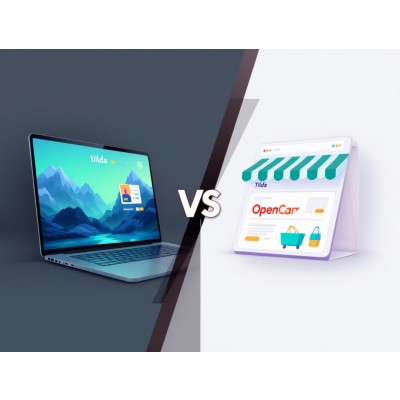надо срочно сюда
что-нибудь добавить
Самые продаваемые в январе 2026 года шаблоны и дополнения: Персональные данные, Стриж, Уведомление о cookie, шаблон Frame.
Новинки за январь 2026 года: Вместе дешевле, Автоматические вложения в письма, Добавление кастомных полей к товарам, Избранные заказы.

Когда Вы впервые задумались о создании собственного интернет-магазина, Вам могло показаться, что Tilda обладает непревзойдённой эстетикой и красотой: плавные переходы, современные шаблоны и возможность собрать сайт буквально за один вечер. Вы, возможно, даже решили попробовать, однако вскоре обнаружили, что подобно покупке дизайнерской сумки без ручек - внешний вид радует, но практичность оставляет желать лучшего.
Обратите внимание на OpenCart. Да, его интерфейс не блистает гламуром, как у Tilda, однако здесь всё сделано «по делу». Хотите добавить 500 товаров с различными вариантами размеров? Эта задача решается без особых затруднений. В Tilda для подобных возможностей Вам, вероятно, придётся прибегать к дополнительным сервисам, и процесс может оказаться запутанным. Что касается SEO, OpenCart предоставляет возможность детально работать с мета-тегами, генерировать карту сайта и выполнять другие необходимые настройки, в то время как функционал SEO в Tilda работает достаточно ограниченно.
Не менее важен и вопрос стоимости. На первый взгляд Tilda может показаться экономически выгодной, однако при подключении корзины, аналитики и домена расходы быстро возрастают до нескольких тысяч рублей в месяц. OpenCart же требует лишь покупки недорогого хостинга (от нескольких сотен рублей Timeweb, Beget, AdminVPS) и домена (в зоне ru от 150 рублей). Конечно, при необходимости установки дополнительных модулей и доработок затраты могут увеличиться, но выбор остаётся за Вами и чаще всего это однократное вложение средств.
Следует также отметить, что работа с OpenCart иногда требует определённых технических навыков. Порой может создаться ощущение, что вы пытаетесь собрать сложное устройство из несовместимых элементов: требуется внести изменения в шаблон, что часто подразумевает корректировку PHP или CSS кода. С другой стороны, существуют готовые темы и дополнения, позволяющие обойтись без глубокого погружения в технические детали - это напоминает аренду квартиры, где внешний вид может быть красивым, но возможности для индивидуальных доработок ограничены.
Tilda, напротив, предназначена для тех, кто ценит эстетичный внешний вид. Она прекрасно подойдёт для создания лендингов, например, для проведения мастер-классов или презентаций. Однако, когда Ваши клиенты начинают задавать вопросы о возможности заказа товаров по оптовым ценам или рассрочки, функциональность Tilda может оказаться недостаточной, что вынуждает прибегать к подключению дополнительных сторонних сервисов, зачастую несовместимых между собой.
Ещё один важный аспект - безопасность. OpenCart, возможно, не является неприступной крепостью, но Вы сами отвечаете за своевременное обновление системы, установку SSL-сертификата и создание резервных копий. В случае с Tilda, если возникнут проблемы с серверами, Ваш магазин может временно прекратить работу, что, конечно, плохо скажется на покупках.
Конечно, это не означает, что Tilda является некачественным решением. Если Вы, например, дизайнер и продаёте ограниченное количество арт-принтов в месяц, запуск простой и красивой витрины с кнопкой «Купить» может оказаться вполне достаточным. Но если Вы планируете серьёзное развитие и масштабирование бизнеса, OpenCart представляется более надёжной платформой.
В заключение хочется сказать: выбор между Tilda и OpenCart зависит от поставленных задач. Если Вам нужна красивая витрина, созданная быстро и без лишних хлопот, Tilda может подойти. Если же Вы стремитесь к созданию собственнго масштабируемого и функционального интернет-магазина, способного работать стабильно и расширяться, выбор в пользу OpenCart будет более обоснован. Наша сборка OpenCartк тому же обладает развитым сообществом: форум, чат и платные специалисты всегда готовы прийти на помощь.
Почему в голове автора нет мысли, что кто-то может покупать в ИМ не только на свое имя, но и оформлять доставку для третих лиц?Такая возможность есть в "коробке", если при заказе убрать галочку "Мой адрес доставки совпадает с платёжным", в таком случае сможете указать другие ФИО и адрес для получения.
ОС не стоит "всего лишь хостинг" - если брать более-менее приятный шаблон это от 2500-3000р и выше, модуль Simple 500, уведомления вПри этом магазин который может показать товары, принять заказ и сообщить об этом продавцу вы можете запустить бесплатно и за час. Все другие расходы чаще всего одноразовые.
телеграм 750-1000р, потом сео, карты, оплата и так далее, и тому подобное. Недешевое удовольствие, особенно для начинающих.